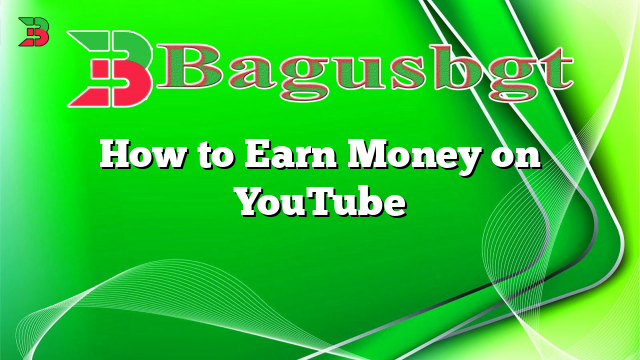Hello and welcome to our comprehensive guide on how to earn money on YouTube. In this article, we will provide you with detailed information on various methods to monetize your YouTube channel and generate income through your creative content.
1. Monetizing with Google AdSense
One of the most popular ways to earn money on YouTube is through monetization with Google AdSense. This program allows you to display ads on your videos and earn revenue based on the number of views and ad clicks. To enable this feature, you need to meet certain requirements set by YouTube, such as having at least 1,000 subscribers and 4,000 watch hours in the past 12 months.
Advantages: Google AdSense provides a hassle-free way to start monetizing your YouTube channel. It offers a wide range of ad formats and customization options, allowing you to optimize your earnings. Additionally, it provides reliable payment options and access to detailed analytics.
Disadvantages: While Google AdSense is a popular option, the earnings can be relatively low, especially for channels with a smaller audience. The revenue generated depends on factors such as the number of views, ad engagement, and the niche of your content.
2. Sponsored Content and Brand Deals
In addition to AdSense, another lucrative way to make money on YouTube is through sponsored content and brand deals. This involves collaborating with brands or companies to promote their products or services in your videos. Brands may approach you directly or you can join influencer marketing platforms that connect creators with potential sponsors.
Advantages: Sponsored content offers the potential for higher earnings compared to AdSense, as you can negotiate the terms and payment with the brand directly. It also allows you to create partnerships and build relationships with reputable brands in your niche.
Disadvantages: Finding suitable brand deals can be challenging, especially for smaller channels. It requires a significant amount of time and effort to negotiate and create sponsored content that aligns with your audience and maintains authenticity.
3. Channel Memberships
YouTube offers a feature called Channel Memberships, which allows eligible creators to offer exclusive perks and content to their subscribers in exchange for a monthly fee. To be eligible, your channel must have at least 30,000 subscribers.
Advantages: Channel Memberships provide a recurring source of income, as subscribers pay a monthly fee to access exclusive content. It also helps foster a stronger community and connection with your most dedicated fans.
Disadvantages: The eligibility criteria for Channel Memberships can be a barrier for smaller channels. Additionally, creating exclusive content requires additional time and resources, which may not be feasible for all creators.
4. Merchandise Shelf
The Merchandise Shelf feature allows eligible creators to showcase their official merchandise directly on their YouTube channel. This feature is available to channels in certain countries and requires participation in the YouTube Partner Program.
Advantages: The Merchandise Shelf enables creators to promote and sell their merchandise to their audience without redirecting them to external websites. It provides a convenient way to monetize your brand and engage with your fans.
Disadvantages: The availability of the Merchandise Shelf is limited to selected countries, which can restrict some creators from utilizing this revenue stream. Additionally, managing merchandise production, inventory, and shipping can be time-consuming and challenging.
5. Crowdfunding and Fan Donations
Another alternative to earn money on YouTube is through crowdfunding platforms and fan donations. Creators can set up accounts on platforms like Patreon, Ko-fi, or PayPal to accept direct contributions from their viewers and fans.
Advantages: Crowdfunding and fan donations provide a direct source of income, allowing creators to rely on the support of their most dedicated fans. It offers more flexibility and creative freedom, as there are no strict guidelines or requirements to adhere to.
Disadvantages: Relying solely on fan donations can be unpredictable and inconsistent. It requires a strong and engaged fan base willing to contribute regularly. Moreover, managing and fulfilling the perks or rewards for different donation tiers can be time-consuming.
6. YouTube Premium Revenue
If you’re eligible, your content might be included in YouTube Premium, a subscription-based service that offers ad-free viewing and exclusive content to its subscribers. As a YouTube partner, you can earn a share of the revenue generated from YouTube Premium subscribers watching your content.
Advantages: YouTube Premium revenue provides an additional stream of income, especially for creators with a large and engaged audience. It rewards creators for creating high-quality content that appeals to YouTube Premium subscribers.
Disadvantages: Not all creators are eligible for YouTube Premium revenue, as it depends on various factors such as the location of your viewers and the engagement of your content. It’s important to note that YouTube Premium revenue might not be a significant portion of your overall earnings.
7. Licensing Your Content
If you have unique and valuable content, you can explore licensing opportunities to earn money on YouTube. This involves granting permission to other individuals or companies to use your content in their projects in exchange for a licensing fee.
Advantages: Licensing your content can provide a substantial income if your content gains popularity and is in demand by other creators or companies. It allows you to monetize your content beyond YouTube and reach a wider audience.
Disadvantages: Licensing opportunities might not be readily available or easily accessible for all creators. It requires creating content that stands out and appeals to a broad range of potential licensees. Additionally, negotiating licensing agreements and ensuring proper attribution can be complex.
8. Affiliate Marketing
Affiliate marketing involves promoting products or services through unique affiliate links in your video descriptions or through dedicated sponsorship segments. When viewers make purchases through your affiliate links, you earn a commission.
Advantages: Affiliate marketing allows you to earn money by recommending products or services that align with your content and audience. It provides a way to monetize your influence and expertise, especially for channels focused on product reviews or tutorials.
Disadvantages: Success in affiliate marketing depends on factors such as the size and engagement of your audience, as well as the relevance of the products you promote. It can be time-consuming to research and select suitable affiliate programs and to disclose your affiliate relationships transparently.
9. YouTube Super Chat and Super Stickers
YouTube Super Chat and Super Stickers are features that allow viewers to make monetary contributions during live chats or premiere events. When a viewer makes a Super Chat or purchases Super Stickers, their message or sticker is highlighted, giving them more visibility.
Advantages: YouTube Super Chat and Super Stickers provide a way for creators to earn money during live interactions with their audience. It encourages viewer engagement and allows fans to show support by making monetary contributions.
Disadvantages: The earnings from Super Chat and Super Stickers can vary greatly depending on the size and engagement of your live audience. It’s important to note that this revenue stream is primarily applicable to creators who regularly host live streams or premiere events.
10. Creating and Selling Digital Products
Lastly, you can monetize your YouTube channel by creating and selling digital products such as e-books, online courses, music, or artwork. You can promote and sell these products directly to your audience through your videos or through other platforms.
Advantages: Creating and selling digital products provides a way to diversify your income and leverage your expertise. It allows you to offer valuable resources to your audience and establish yourself as an authority in your niche.
Disadvantages: Developing high-quality digital products requires time, effort, and expertise in your chosen field. It can be challenging to effectively market and sell these products, especially for smaller channels without a dedicated audience.
| Question | Answer |
|---|---|
| 1. Can anyone earn money on YouTube? | Yes, anyone can earn money on YouTube as long as they meet the eligibility criteria and adhere to YouTube’s policies. |
| 2. How much money can I make on YouTube? | The amount of money you can make on YouTube varies depending on factors such as your channel’s niche, audience size, engagement, and monetization methods. It’s important to note that earnings can be inconsistent and may require time and dedication to build up. |
| 3. Are there any upfront costs to start monetizing on YouTube? | No, there are no upfront costs to start monetizing on YouTube. However, you might need to invest in equipment, software, or resources to improve the quality of your content and attract a larger audience. |
| 4. Can I monetize copyrighted content on YouTube? | No, you cannot monetize copyrighted content on YouTube unless you have the necessary rights or permissions from the copyright owner. It is important to respect intellectual property rights and avoid using copyrighted material without proper authorization. |
| 5. How often will I get paid by YouTube? | YouTube pays creators on a monthly basis, usually around the 21st of each month. However, you need to reach the minimum payment threshold, which is $100, before you can receive your earnings. |
Conclusion
Earning money on YouTube requires dedication, consistency, and a strategic approach. By utilizing various monetization methods such as Google AdSense, sponsored content, channel memberships, and merchandise sales, you can turn your passion for creating videos into a sustainable source of income. It’s important to experiment with different strategies, analyze your audience’s preferences, and adapt your content accordingly. Remember, building a successful YouTube channel takes time and effort, but with the right approach, you can turn your channel into a thriving online business.
 Bagus Banget Kumpulan Informasi terbaru dari berbagai sumber yang terpercaya
Bagus Banget Kumpulan Informasi terbaru dari berbagai sumber yang terpercaya



